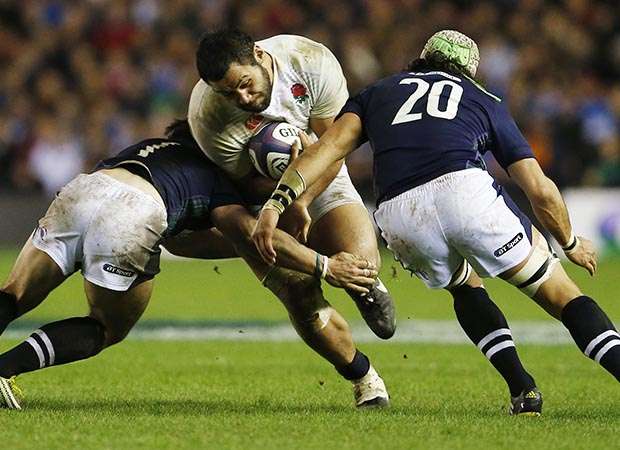
 The World Cup has them, and so does the European Champions Cup. So, too, does the Rugby Championship, the Southern Hemisphere’s flagship international tournament. We are talking bonus points, and the question ‘if it’s good enough for them, why isn’t it good enough for the Six Nations?’ is becoming more pressing.
The World Cup has them, and so does the European Champions Cup. So, too, does the Rugby Championship, the Southern Hemisphere’s flagship international tournament. We are talking bonus points, and the question ‘if it’s good enough for them, why isn’t it good enough for the Six Nations?’ is becoming more pressing.
The last time I looked the 2015 World Cup was being hailed as the best there has been, the European Cup has gone into a new orbit of competitiveness, and the Rugby Championship produced the two international teams ranked one and two in the world, New Zealand and Australia.
Having accepted the “if it ain’t broke don’t fix it” argument for a number of years, there is the sense after a World Cup in which there weren’t any Northern Hemisphere semi-finalists for the first time that the Six Nations might be just about to blow a gasket.
The first signs of a fault line may have come last weekend when a crowd of just 64,000 saw France play Italy at the 80,000 capacity Stade de France. Those 16,000 empty seats may simply be because Italy are not a big draw for French fans, but there is also a sense of complacency surrounding the Six Nations.
It’s not just that the number of tries scored in the tournament has declined steadily because there is more emphasis on defence than attack, but that the quality of the rugby is not good enough to produce world champions. England are still the only Six Nations side to have won the World Cup, compared to seven Southern Hemisphere winners. The reality is that the Six Nations has become the second division of international rugby in terms of quality, even if – for the moment – it knocks the Rugby Championship into a cocked-hat in terms of atmosphere.
There is, however, a serious threat that the carnival atmosphere will dissipate because of anti-social Friday and Saturday night fixtures, and an increase in Sunday games, being foisted on travelling fans by the demands of the television god. Add to that the endless hike in ticket prices by greedy Unions, and the fans who create the match-day atmosphere could become disenchanted.
Before the 2016 tournament started the complacency was reflected when the Six Nations chief executive, John Feehan, said: “The bonus point question comes before the Six Nations committee pretty well annually. It is always considered, but the stumbling block remains the same.”
 The stumbling block in question is, Feehan says, that each team play an odd number of games with three at home and two away, or the reverse, every two years. However, the argument that bonus points compromise the competition because those with more home matches gain an unfair advantage in securing them, does not stand scrutiny.
The stumbling block in question is, Feehan says, that each team play an odd number of games with three at home and two away, or the reverse, every two years. However, the argument that bonus points compromise the competition because those with more home matches gain an unfair advantage in securing them, does not stand scrutiny.
There are already unfair advantages throughout the Six Nations which the proponents of the status quo turn a blind eye to. Ireland and France have enjoyed a disproportionate number of opening fixtures against the two weakest sides in the competition, Scotland and Italy, in recent seasons.
This is largely down to a TV schedule which has been doctored by broadcasters in the hope of securing a grandstand – or Grand Slam – finish to the tournament every year.
As Wales coach Warren Gatland said at the tournament launch: “In the past 15 years we haven’t always had the most favourable draw in terms of who we have been up against first. I know England have had some tough draws as well. It is a competition of confidence and momentum. If you win the first couple of games, you have a good chance of going on winning. Who you get first up, whether or not you are at home, or how strong the teams are you face in those first two matches, can definitely be a factor.”
Likewise, there are serious flaws in the ‘Super Saturday’ final-round formula which sees the three fixtures given staggered starting times to maximise the television audience. Last season Wales were at a significant disadvantage in playing Italy first, leaving their main rivals, Ireland and England, a points target to aim for.
Remarkably, Wales find themselves at the same disadvantage this season with their final game – again against Italy – once more the first on the roster. Wales captain Sam Warburton voiced his displeasure at finding his side faced with the same running order: “We’re the first team to play on the final day again. I think it would be best if we all played at the same time.”
The reality is that for all the algorithm-style attempts by broadcasters to arrange repeat versions of ‘Super Saturday’ every season, the chances of having four teams tilting for the title on the final weekend again any time soon are remote.
By comparison bonus points encourage attacking rugby by not only rewarding teams for winning, but also going out to score tries. This has the benefit of making every game a spectacle. It also rewards teams who are on the losing end for playing well. It encourages them to push the opposition to the brink in pursuit of a maximum two losing bonus points (one for scoring four tries, and one for losing by seven or less).
This season a new factor has arrived in the form of £15m bonanza in prize money being offered to the participating nations in the wake of the new BBC-ITV joint television contract. The riches on offer, which include £5.5m for a Grand Slam, £4.5m for winning the Championship, £3.5m per coming second, and £2.5m for third, are likely to cause strife unless the Six Nations format is seen as being scrupulously fair – which currently it is not.
There are statistical claims that bonus points also rank teams from the strongest to the weakest more accurately than, under the exiting format, rewarding participants with wins and draws, and then eventually separating them on points difference.
Ireland’s last two Championship wins have come from points difference, and were merited because everyone knew the rules. Nevertheless, I’d argue that it’s better to have a title-winning team which has got there by scoring more tries, than one which has accumulated a better points differential by kicking more penalties.
The other bogus argument against the Six Nations being decided by bonus points is the danger of having a side with more wins – or even a Grand Slam – being denied the title by a less successful team with a hatful of bonus points. The formula for avoiding this could be as simple as awarding the winner of a Grand Slam a one-off additional bonus point haul to ensure they finish top of the table. A tally of 10 bonus points for a Slam, or six for winning a title play-off, should do it.
Whatever the pros and cons of the argument, the success of bonus points in encouraging attack over defence in other tournaments cannot be denied. Nor can it be argued that the Six Nations playing field is level, or sacrosanct, because numerous changes have taken place over the last 15 years.
The Six Nations committee should get its head out of the sand and recommend the introduction of a bonus point system in the tournament on a two-year trial basis, with the right to extend or curtail it after that period, depending on its success.


United Rugby Championship
Vaea Fifita’s commanding presence has Scarlets pushing for URC play-off spot



























You must be logged in to post a comment Login